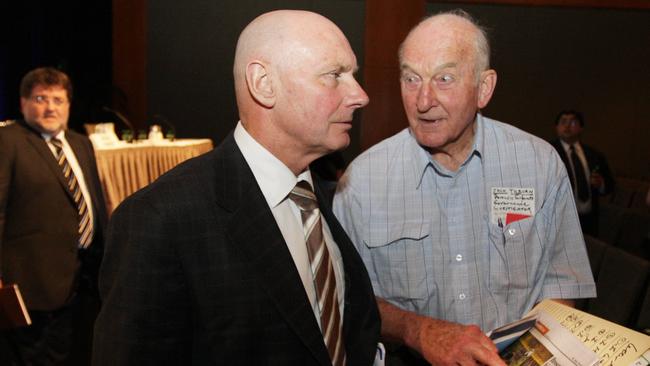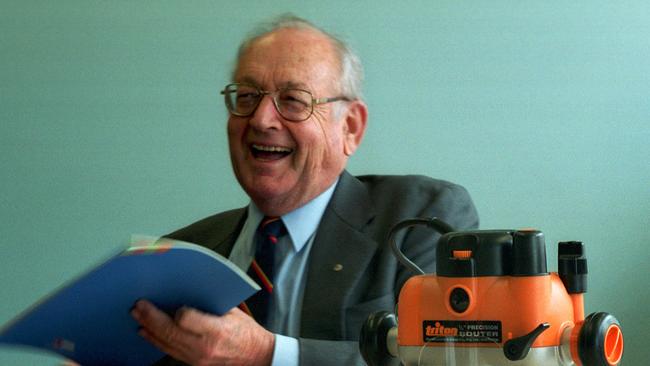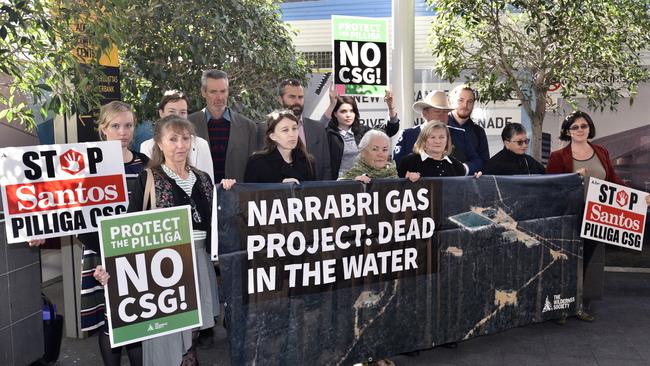
Hills Industries, probably still best-known for the iconic laundry dehydration device which bears its name, was also for many years the holder of Adelaide’s best-loved annual meeting.
Presided over by the venerable Bob Hill-Ling AO, who started on the shop floor of the family business and rose to managing director and then chair, they were equal parts comedy routine, extended “family” get-together and shareholder update.
In his later years as chairman of the company, the avuncular Bob would beg the indulgence of the crowd — warmly and eagerly granted each time — to tell a few zingers.
This one, dating back two decades, is vintage Bob.
Paraphrasing, as the exact wording has been lost: “Have you heard of the John Howard diet?”
“You only eat when he says something funny.”
Boom-tish! And on with the show.

The Hills annual meetings I attended were held on a Friday afternoon, all the better to ease into the weekend, as shareholders were invited to share a glass of red with the board and senior management after proceedings wound up.
Don’t get me wrong, it was also a serious business. The company, being one of the state’s oldest and proudest, had a welded-on shareholder base that 15 years ago were staring down the barrel of the Chinese manufacturing juggernaut that demanded a significant and difficult shift in the company’s strategy.
These people, who were often reliant on dividends for their income, were very engaged with the fortunes of the company they had part-ownership in.
The chance to turn up once a year, ask difficult questions of management and the board, then, naturally, tuck into a feed after the meeting closed, was taken up by numbers in the hundreds.
It’s been a running gag that AGM season is a great way to feed and water yourself for a few weeks on the company dollar, and, guessing by the number of attendees who appear to snooze through proceedings, maybe the chance for an outing and a quick bite.
But reflecting on a year in which annual meetings were, by necessity, rushed into the virtual sphere, it’s worthwhile to pause and consider what we’d miss out on should the need to hold meetings physically as well as online be set aside.
Please explain
While most annual meetings could well be prescribed as a cure-all for insomnia, they provide a forum which demands that boards and management front up and explain themselves to the people who do actually own the company.
Shareholders, be they the owners of large or small parcels, get to eyeball their managers and assess for themselves whether the company strategy is something they want to stay aligned with. They can ask questions, and see for themselves if the managing director is confident and self-assured? Is the strategy update coherent and well articulated? Or do the chairman, other board members, and the managing director even get along?
Then they would look at the proceedings — are these being rushed because uncomfortable questions might arise, and what happens when they do?
Some annual meetings, particularly in the energy sphere, have become a forum for what some would call activism, and others would call a necessary debate on issues such as climate change and environmental protection.
Adelaide’s largest company, Santos, has been at the forefront of this push, with savvy activists taking advantage of the 100 shareholder rule to requisition agenda items which, to generalise, have effectively called on the energy company to shut itself down.

Chairman Keith Spence has dealt with these, and other issues such as debates at the AGM over the Narrabri gas project, by, in most cases, patiently and professionally answering every question put to the company or passing it on to management more qualified to do so.
It’s been impressive to watch and something that would undoubtedly inspire confidence in the 500 or so Santos shareholders in the room.
Unfortunately, in a virtual AGM, you’d miss a lot of the nuance in these debates.
You’d miss the supporters of the activists giving a small cheer when questions were asked.
You’d miss the slow rumble of disapproval building among shareholders who see it as a distraction, and you’d miss the round of applause that went up one year when the real question on the majority of people’s minds was asked: “What are you doing about franking credits?’
Annual meetings have also provided a forum for some great theatre over the years.
Former Labor senator Chris Schacht is a great one for getting up at meetings and asking, in more polite terms: “Just what do you people think you’re doing with my company?”
Jack Tilburn, the late “corporate terminator” attended hundreds of annual meetings, asking questions that were often pointed, sometimes arguably granular to the point of absurdity, about issues such as fonts and colours in annual reports.
“You’ve all had it! You’re all too old! Vote no against the whole bloody mob!” he once thundered.
Sometimes this sort of questioning verges into pedantry, but how a chair and management respond is telling, and it’s something that can all too easily be shut down, or simply not be allowed to emerge in a virtual setting.
There is also not the chance to approach management for a quick, one-to-one chat after the meeting in the virtual sphere.
One AGM I “attended” in 2020 went for 70 seconds. The meeting closed, the screen went blank. Done.
As a journalist I had the benefit of a follow-up phone call, but obviously almost everyone else did not have that luxury.
The ability to buttonhole the chair on the way out of a meeting might be uncomfortable for them, but it’s a useful, informal way for shareholders to participate in the running of their company.
Annual meetings in Australia have for too long been stuck in the past — with many exceptions, which have been doing a decent job on the technology front.
It’s great that we are now able to attend meetings virtually and for those unable to travel all over the nation to attend meetings — which is almost everyone even in good times — it’s a step forward for shareholder rights.
But holding a physical annual meeting should be an obligation, not an option going forward.
And hold them on Fridays, with wine.



